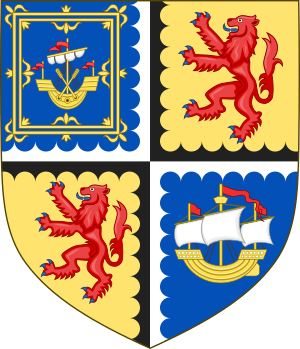William Sinclair, 2nd Earl of Caithness facts for kids
Quick facts for kids
William Sinclair
|
|
|---|---|
| Earl of Caithness | |

Earl of Caithness Coat of Arms
|
|
| Predecessor | William Sinclair, Earl of Orkney and 1st Earl of Caithness |
| Successor | John Sinclair, 3rd Earl of Caithness |
| Born | c. 1459 |
| Died | 9 September 1513 |
| Noble family | Clan Sinclair |
| Father | William Sinclair, Earl of Orkney and 1st Earl of Caithness |
| Mother | Marjory Sutherland |
William Sinclair (born around 1459 – died September 9, 1513) was an important Scottish nobleman. He was the 2nd Earl of Caithness and the leader, or chief, of the Clan Sinclair. This was a powerful Scottish clan from the Scottish Highlands.
Contents
Early Life of William Sinclair
William Sinclair, the 2nd Earl of Caithness, was born at Ravenscraig Castle in Kirkcaldy, Scotland. He was the second son of William Sinclair, 1st Earl of Caithness. His mother was Marjory Sutherland, whose father was Sir Alexander Sutherland of Dunbeath Castle.
Becoming Earl of Caithness
William Sinclair received a special document called a charter from James III of Scotland. This charter, given on December 7, 1476, made him the Earl of Caithness. It meant he and his future family would hold this important title. The charter also gave him control over the Hospital of Saint Magnus at Spittal. In 1480, he received another charter that gave him more power in the area.
William Sinclair was loyal to the king during a difficult time. In 1488, James III of Scotland's own son led a rebellion against him. The Earl of Caithness supported the king during this conflict.
He was involved in official documents about land. One charter, dated March 14, 1496, was for lands in Caithness. It was signed at Castle Sinclair Girnigoe. Another charter, from December 3, 1498, was for land in "Hjaltland" (which is now known as Shetland). This one was signed in Edinburgh.
William, Earl of Caithness, lived at Castle Sinclair Girnigoe. This castle was built on a rocky area near Noss Head. It was on the east side of Sinclairs Bay. Today, only the ruins of the castle remain.
In 1505, he took part in the Scottish Parliament. This was an important meeting where laws and decisions for the country were made.
The Battle of Flodden
In 1513, William Sinclair joined James IV of Scotland in a major battle. This was the Battle of Flodden, fought against the English army. The battle took place on September 9, 1513. Sadly, both William Sinclair and King James IV were killed during this battle.
Family Life
William Sinclair married Margaret Keith. She was the daughter of Sir William Keith, 4th of Inverugie. Margaret Keith also lived at Ackergill Tower. This was a very strong tower located near Sinclairs Bay, about two miles north of Castle Sinclair Girnigoe.
William and Margaret had the following children:
- John Sinclair, 3rd Earl of Caithness (died 1529). He married Elizabeth Sutherland (died 1527).
- Alexander Sinclair of Stempster. His daughter, Helen, married Donald Mackay, 11th of Strathnaver. Alexander was an ancestor of the Sinclairs of Dunbeath.
- William Sinclair, who was a natural son (meaning he was born outside of marriage).
Some historical records suggest that William Sinclair might have had another daughter named Margaret. According to these sources, Dame Margaret Sinclair married Sir Thomas Kirkpatrick. They did not have any children.
See also
 | James B. Knighten |
 | Azellia White |
 | Willa Brown |

